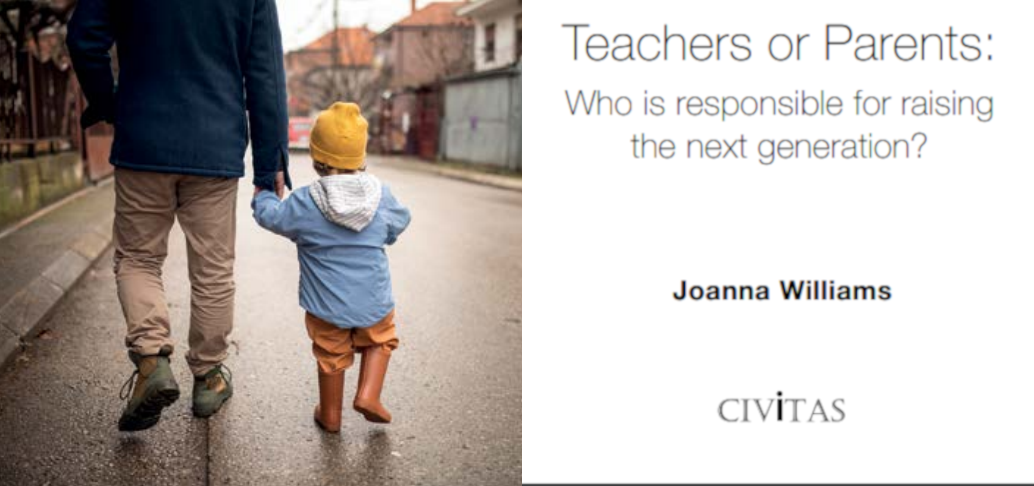Who is responsible for raising the next generation?
A new report by Civitas, authored by Joanna Williams, and titled “Teachers or Parents?”, critically examines the increasing influence of controversial social and political ideologies in UK schools, with a particular focus on gender identity and race. It argues that teachers are overstepping their role by promoting ideologies without parental consent or balanced perspectives. Civitas contends that parents should reclaim authority over sensitive subjects, especially regarding issues of sexuality, race, and gender identity. The report emphasises the need for transparency, advocating for parental consultation and greater balance in educational materials.
Concerns Over Ideological Education
The report suggests that schools are promoting a one-sided view of complex social issues, leaving students exposed to ideologies that may not align with their family values. Civitas asserts that these teachings, often influenced by external activist groups, go beyond education and into activism, pushing particular viewpoints on gender identity, race, and other sensitive topics. This, the report argues, creates a classroom environment where children are not encouraged to think critically or encounter a balanced range of ideas.
One of the most concerning trends, according to Civitas, is the promotion of gender identity theory. The report highlights examples where children are taught about gender fluidity, transgender identities, and sexuality in ways that may confuse or pressure them into questioning their identities at a young age. Policies that allow students to socially transition without parental knowledge are criticised as undermining parental rights, and the report calls for a careful re-examination of how these subjects are introduced to children.
Parental Rights and Responsibility
The crux of the Civitas argument is that parents, not schools, should have primary authority over their children’s education when it comes to moral, ethical, and controversial issues. Civitas believes that many parents are unaware of what their children are being taught in relation to gender identity and race, particularly as schools often fail to disclose the specifics of their lesson plans. The report claims this undermines the traditional role of parents in guiding their children’s moral and ethical development.
Civitas also critiques the broader movement toward RSE (Relationships and Sex Education) reforms, suggesting that it often imposes ideologically driven content that is at odds with parental wishes. The report emphasises that education should support the family unit, not work against it, particularly when dealing with personal and controversial topics.
Transparency and Balance in Education
The report advocates for greater transparency in the curriculum, particularly with regard to sensitive topics. Civitas calls for schools to provide clear, detailed information about lesson content, especially when covering issues such as gender, sexuality, and race. Parents should be consulted and given the right to opt out of lessons that conflict with their personal or religious beliefs, the report recommends.
Moreover, Civitas argues that schools should ensure that students are exposed to a balanced range of perspectives. The report expresses concern that current educational approaches do not present a variety of viewpoints, instead promoting singular interpretations of issues like gender identity. This lack of balance, Civitas argues, undermines the development of critical thinking skills in students.
Safeguarding and Ideological Neutrality
The report also raises concerns about safeguarding, particularly in relation to gender identity teachings. Civitas suggests that schools are not properly safeguarding children when they allow or encourage them to question their gender identities at young ages without sufficient psychological support or parental involvement. The report calls for a more cautious approach, ensuring that schools remain neutral on these issues and do not push children toward decisions or identities that could have long-term implications.
In terms of broader educational practices, Civitas warns against what it perceives as ideological capture in schools. It claims that external activist groups and ideologically motivated teachers are influencing curricula in ways that do not align with the traditional educational mission of fostering critical thinking and open inquiry. Instead, these influences promote a narrow set of ideas, creating a classroom environment that prioritises activism over education.
Conclusion and Recommendations
The Civitas report concludes by urging schools to refocus on their primary educational mission—teaching critical thinking and providing students with a well-rounded, balanced education. It calls for a return to parental involvement and transparency, advocating for policies that protect parents’ rights to guide their children’s education on sensitive issues.
The report does not call for government intervention but instead places the responsibility on schools and local communities to ensure that parents are engaged in the process. Civitas also stresses the importance of balance in presenting different perspectives, suggesting that by fostering an open dialogue and avoiding the imposition of controversial ideologies, schools can better serve the diverse needs of their students.
In sum, “Teachers or Parents?” emphasises the need for schools to remain neutral spaces of learning, where controversial social issues are handled with care, and parents’ rights are respected.

